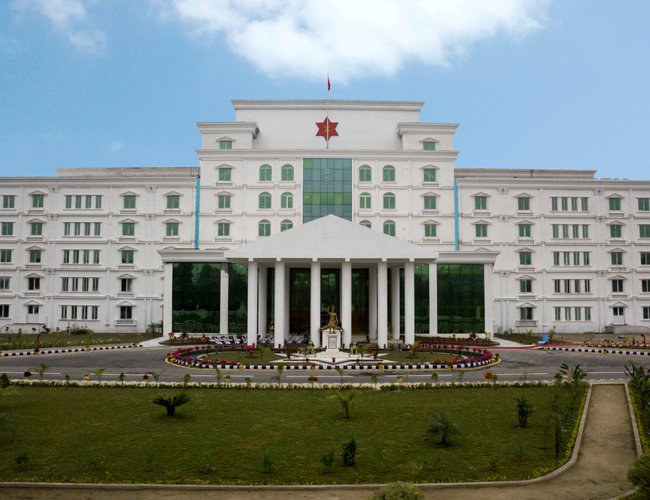
Humanity's New War against the Corona Virus (CoV2) causing the (CO for Corona VI for Virus D for Disease first reported in Wuhan, China in late December 2019), hence COVID 19 pandemic, is approaching a new phase with active cases globally surpassing two million and over hundred and thirty thousand deaths. Although believed to have entered the 2nd stage, Nepal has so far been less affected, just 16 positive cases and most tests proving negative. But, public health experts are warning that the pandemic may be peaking in the developed world but heading to the poorer parts. So, COVID19 can still pose a serious challenge to our national (human) security and we must be ready.
After losing valuable time initially, the government has started taking preventive steps and preparations in case the pandemic starts to hit us harder. Institutional arrangements from the centre, provinces to local levels have been established and activated. Available equipments and medicines are being distributed and more tests and contact tracing are now taking place. According to government report Interim Guidelines for COVID 19 and other outbreaks have been circulated, lab services have been expanded with COVID 19 testing through Polymerase Chain Reaction (PCR) operating in 13 places across the country. 29, 820 quarantine beds have been readied with 7166 people currently using them. 3,155 isolation beds have been created with 94 individuals already in them. Out of the almost 5,000 people tested under PCR only 9 have been positive. Out of the 5,287 tested under Rapid Detection Test (RDT), no positive case were found. Hospitals have been especially designated. 2261 sets of Personal Protection Equipment (PPEs) are currently in stock.
Government has been trying, but, feedback from frontlines reflect the urgency of more actions in ameliorating the difficulties faced by the people, especially the poorest and most vulnerable sections of society, due to lockdown. More importantly, lockdown only gives time to prepare in case of future surge. That is why, Government plans to be able to treat up to 30, 000 at one time if needed. To equip such facilities, after failing to import vital equipments and medicines through other channels, Government also decided to entrust bulk import of these items on Government to Government (G to G) basis to Nepal Army (NA). Why has this decision generated so much controversy? The debate can be seen from three perspectives, Legal/Institutional, Operational/Technical and Political/Geo-political.
Legal/Institutional: Existing legal provision relating to pandemics goes way back to Communicable Disease Act 2020. The Constitution of Nepal 2072, under Section 30, Article 273 identifies Pandemics among the six factor creating a State of Emergency. But none of the other legal provisions such as the Disaster Mitigation and Management Act 2074, Nepal Government Work Division Regulation 2074 or the institutions created under them such as National Disaster Risk Mitigation and Management Authority or the National Emergency Management Centre, all related with Disaster Responses either envision or cover the current situation of pandemic prevention, control and treatment. In the current situation, which is not yet a State of Emergency, but if not prevented, has the potential of posing a serious threat, the institutional mechanism, the COVID 19 Crisis Management Centre (CCMC), under the Ministry of Defense, and headed by the senior most Minister and Dy. Prime Minister in the Cabinet, best fulfills the existing Constitutional, legal and Institutional parameters for the Whole of Government approach without invoking the State of Emergency rights.
Operational/Technical: Of course, this is, first and foremost, a health issue and the lead should be taken by the health authorities. Doctors and medical professionals are the Generals and frontline fighters in this war. In such a context some question, why is the NA being so closely involved? Some even fear large number of NA personnel could get infected and hence not only exacerbate the COVID 19 problem but also affect NA's capability to carry out its core functions in case of real emergency. Well wishers are also worried, by getting involved in such activities the NA will lose focus on its core National Security responsibilities. Some even suspect, the government is using the NA to cover up its previous allegedly "irregular" deal, which could tarnish NA's image, already battling charges of past corruption cases.
Aware of these concerns, in normal situation NA could and indeed should decline such assignments and let the concerned agencies of the State take the lead. But, this is a crisis. NA has always played crucial role at times of disasters or crisis. The Constitution gives the NA vital role of the ultimate protector of national interest and guarantor of national security. The National Security Policy clearly states "The NA will play a key role in meeting any serious challenges to national security". In such a context, how can or should a professional and disciplined national army disobey the decision of the elected government in difficulty? NA, however must handle the situation efficiently and transparently, rejecting any pressure from any source. If done well, the NA can yet again prove its institutional strength in serving the nation and people.
To prevent the COVID 19 pandemic going out of hand country must act with speed and unity. Those in the frontline must be given what they need and protected. More test kits and masks are urgently needed, enough PPEs and ventilators must be stocked. If we allow CoV2 virus to spread further, it could have devastating effect, as already witnessed in many other countries with far better healthcare services. Rising numbers in India with which we have open border is another worry. To respond, we need not just the Whole of Government but Whole of Nation/Society approach.
Political/Geo-Political: Some intellectuals and politicians argue, by involving the NA actively in the War against COVID 19, the government is politicizing and making the NA ambitious. But these critics overlook the current institutional decline and decay due to excessive politicization of all sections of society. The result is, the political-civilian machinery unable to import one billion rupees worth of medical equipments and medicines urgently needed without creating so much outcry, comfortable in spending more than half of the total annual budget in the last two months of the fiscal year, people know why. Ideally, army should not be involved in trading and the civil service must be strengthened. But, institutions are not created or strengthened overnight. It takes political will and time. Do we have that now?
Some people are also stuck with NA's past identity with the monarchy. Others see army as a conservative force resistant to change, opposed to liberal democracy or even an agent of counter-revolution. So they suspect the government's step encouraging the NA to Pakistani, Thai or Myanmar models. But don’t they see the entire intellectual edifice on which the monument of secure, prosperous and liberal democracies are built and sustained, shaking? In this situation, what will people in newly democratizing societies think of democrats targeting the army even at times of national emergency? Rather than worrying about NA becoming ambitious or talking of Pakistani model, real democrats would do well to devote their energies on redressing the inherent weaknesses within liberal democracies as pointed out by scholars since so long and being experienced now.
Criticism of government's decision also seems to be coming from sections within the ruling party unhappy with the group in power. Should the role of the party be in establishing ideological policy platform for elections as in democracies or guide day to day state affairs? This is an interesting debate in Nepal's Socialism Oriented Democracy. Those who have enjoyed perks of state power want to get back and new groups also want a share. So, there is no big surprise in criticism coming from diverse groups hoping to fish in muddy waters if the government fails in handling the pandemic. But, realistically, what happens to Nepal's politics in the near future will largely depend on politics within the ruling party and in some ways, the NC, down but not out.
Like all big events COVID 19 pandemic also has serious geo-political implications, which will play out in greater intensity in the future, as can be seen from the propaganda warfare. COVID 19 may have started there, but China also has been the most successful in controlling it. While others remain paralyzed, even its initial epicenter, Wuhan is slowly returning to normal. This means, China may also be on the faster road to recovery. Reflecting the current global dependence on China, reports show how key NATO members, supposed to be coming to each other's rescue, are instead accusing each other of "piracy" in snatching vital cargo destined for them from the country they call "main competitor or adversary". 80 percent of raw materials for the pharmaceutical industry in India and medicines for the US come from China. If this is the situation now, what will post COVID 19 period bring? In this background, some people probably fear the NA, traditionally close to India and USA, also getting closer to China as it gets the responsibility of importing medical equipments and materials for fighting COVID 19, most obviously from China.
Indian and Western concerns of China's rising influence in South Asia are well known. Manifestation of such concerns can intensify in the future. It is noteworthy that to help fight the COVID 19 pandemic US has announced large financial assistance. India has established 100 million dollar SAARC Fund in which we too have contributed and can draw upon. China, of course, in the best position, has already sent some help and pledged more. Without worrying about the media debate, NA should activate all channels to obtain the equipments and medicines of technical specifications provided by the concerned agencies quickly and in best possible terms from different sources, demonstrating its skills in defence diplomacy, protecting the interests of Nepal and Nepalis by utilizing the goodwill of all our foreign friends.
Conclusions: When and how did it start, will end or what does the post COVID 19 World look like? No one knows. World's 10 best known thinkers give some likely scenarios. The world will turn inwards, geographically and institutionally, making the nation-state, already the most important and powerful institution human mind has invented so far, even more important and powerful. Globalization and multilateralism will be weakened. In this new global paradigm flux weak states will face more difficulties raising the number of failed states.
In such a world can the State machinery unable to import vital medical equipments and materials efficiently in an emergency, used to spending most of the annual budget in the last 2 months of the fiscal year protect Nepal's national interests? Things must change. But change can come only if the main political actors come (or are brought) together to the realization of enlightened national interest that the current dysfunctional civilian machinery needs to change. Only then there will be no need to give the NA duties reserved for other agencies of the State.
Simkhada, former Permanent Representative to the UN and Other International Organizations in Geneva including the WHO and Ambassador to Switzerland currently writes and lectures on International Political-Economy and Security

















